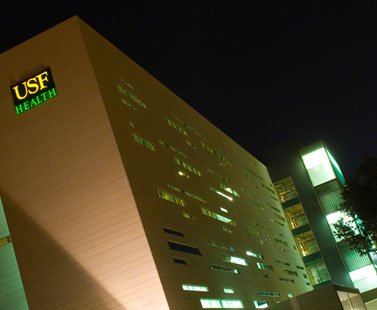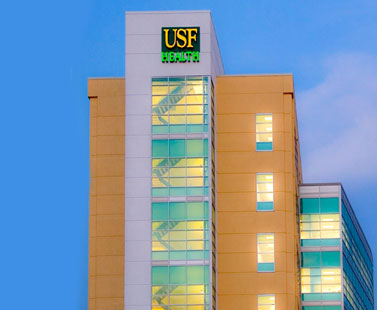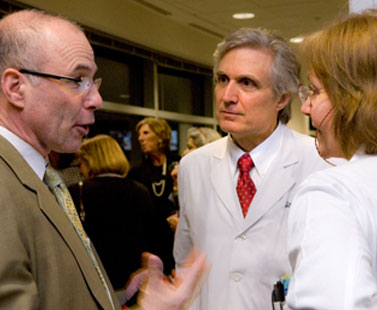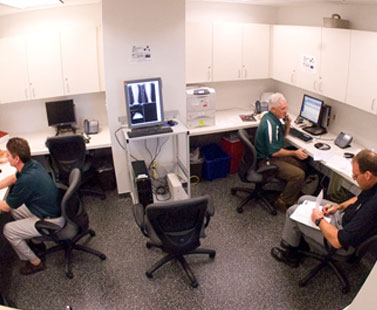Dr. Stephen Klasko: Rebuilding Healthcare in Tampa Bay

When it comes to caring for patients, Dr. Stephen Klasko is an impatient man.
He wants to give patients the kind of care that everyone else will be providing 10 years from now.
Today.
As the CEO of USF Health and dean of the USF College of Medicine, Dr. Klasko is in charge of educating tomorrow’s doctors, nurses and public health professionals. But he has another mission as well: improving the care that USF doctors and health care providers give to patients.
When USF began to talk about renovating its health clinic, Dr. Klasko decided that wasn’t enough. He didn’t want to provide the same kind of care a little bit better. He wanted to give USF Health patients a whole new kind of care.
“We’re not going to do the same old thing,” Dr. Klasko said. “We’re going to build the center for the future.”
That idea eventually bloomed into two new centers for patients. The Carol & Frank Morsani Center for Advanced Healthcare opened last summer, and the South Tampa Center for Advanced Healthcare opened in 2007. They’re the embodiment of Dr. Klasko’s vision to provide care that is built around the patient’s needs.
First, Dr. Klasko wanted USF to treat patients according to their medical needs, rather than by the school’s faculty departments.
“Patients don’t view their lives as departments,” he said. “If you have a headache, you don’t know whether you have a neurologic headache, a family practice headache, a psychiatric headache or a neurosurgical headache. But in Tampa, you’d have to go to four different doctors to find that out.”
He talks about all this with the zeal of a missionary. Dr. Klasko is a high-energy guy: he talks fast, and with conviction, ready to convert everyone to his cause. When he talks, he’s rarely still. He rolls his chair, taps his foot.
A VISION FOR THE FUTURE
Now approaching his five-year anniversary leading the medical school, Dr. Klasko has built a reputation as an innovator. He came to USF in 2004 after serving as dean at the Drexel University College of Medicine. Dr. Klasko holds an MBA as well as an MD and advocates an entrepreneurial approach to medicine.
Dr. Klasko has been known to use unconventional means to make a point. He’s the co-author of a book, The Phantom Stethoscope, designed to help doctors understand the business side of medicine. It features a medical resident who has been abducted by aliens, then returned to earth.
“He’s a breath of fresh air,” said Dr. Bill Dalton, CEO of H. Lee Moffitt Cancer Center & Research Institute, the nationally-ranked cancer center next door to the medical school. “He’s very, very patient-oriented, but he’s also physician-oriented. He looks at what makes it easier for the physician to do their job and deliver it to the patient.”
As an OB/GYN, it especially irks Dr. Klasko that many women have to go to their annual gynecological exam, get a prescription there for a mammogram, make a separate appointment for that exam, and then wait for days to hear the results.
“It takes nine days to get a mammogram done,” for many patients, he noted.
At the Morsani Center, patients don’t have to make separate appointments at different locations for testing. Instead, it’s one-stop shopping – and one appointment instead of three.

The Carol and Frank Morsani Center for Advanced Healthcare
The way the new centers are set up makes it easier for doctors to consult with each other about a patient’s care, said David L. Keefe, MD, chair of USF’s Ob/Gyn Department.
“I’ll see a patient and become aware she needs to see one of my colleagues, and I’ll pop around the corner” and ask that doctor to stop by, Dr. Keefe said. “You can see the patient feels a tremendous sense of relief, for not being tossed around. Hopefully, we can navigate them through in a smooth way.”
Similarly, Dr. Klasko has changed some of USF’s key specialties to organize them around the medical treatment, rather than a department.
USF’s division of cardiovascular services, for example, includes cardiologists and surgeons. Its sports medicine program includes orthopedists, family practitioners trained in sports medicine, and physical therapists.
During his first year at USF, Dr. Klasko also re-organized the health colleges to bring medicine, nursing and public health closer together. The new enterprise was dubbed USF Health. It encourages faculty members from different colleges to work on joint research projects and requires students to take classes in different colleges.

South Tampa Center for Advanced Healthcare
The next addition to USF Health will be a Doctor of Pharmacy program, approved in January by the state’s Board of Governors. USF hopes to enroll the first students in Fall 2011.
Like USF’s other new enterprises, the pharmacy program looks forward. Students will learn to use electronic prescriptions and medical records. It’s part of Dr. Klasko’s commitment to extending the use of electronic prescribing. He’s also working on a project to help teach Tampa Bay doctors how to use e-prescribing software.
Dr. Dalton likes Klasko’s approach to the e-prescribing effort.
“Doctors are notoriously very conservative, and frankly not risk-oriented when it comes to trying new things,” Dr. Dalton said. “But Steve is very good at communicating what (e-prescribing) tries to do.”
REACHING HIGHER
At times, Dr. Klasko’s passion for change has ruffled feathers. His pursuit of building a hospital for USF has drawn fire from some community hospital leaders in Tampa Bay, who say it would take business from theirs. Dr. Klasko, however, says such a hospital would improve health care for Tampa Bay residents and draw patients, researchers and biotech industries to the area.
“Our mission is to be the driver for making the community healthier,” he said. “We will raise the bar for health care in Tampa Bay.”

Dr. Klasko shares his vision with Drs. Michael and Anna Parsons at the South Tampa Center for Advanced Healthcare opening.
That drive for excellence has helped Dr. Klasko attract doctors from top medical schools around the country. Over the past few years, he’s brought in leading faculty members from the Cleveland Clinic, the University of California San Diego, and Brown University.
Dr. Keefe, for example, came to USF in 2005 from Brown, where he was an associate professor and the director of Reproductive Medicine and Infertility at Women and Infants Hospital in Providence and at Tufts-New England Medical Center in Boston.
It turns out that Dr. Keefe became aware of Klasko’s work years earlier, when he read The Phantom Stethoscope and became a fan.
“That kind of energy and passion and vision are all too rare in health care today,” Dr. Keefe said. “The dean’s approach is a blueprint of what’s laid out for us. It fits the challenges we face” to reform health care.
STALKING A KILLER
One of Dr. Klasko’s top priorities for USF Health is to reshape the treatment of one of the nation’s leading killers: diabetes.
He wants to build on the success of one of USF’s leading researchers, Jeffrey Krischer, PhD. Dr. Krischer, who holds the Endowed Chair in Diabetes Research, has won $389 million in federal grant funding for epidemiological research into the causes of Type 1 diabetes, as well as ways to prevent and cure the disease.
USF is working to expand its clinical research, expand its existing diabetes education center, and establish a center that will provide diabetes patients with the best possible care.
Diabetes patients often see 8 or 9 different doctors who don’t communicate with each other, and research has shown that only about 55 percent receive appropriate care, Klasko pointed out. Such gaps can mean extra expense, such as different doctors repeating the same test. But they can also mean that needed preventive care, such as a simple annual eye exam, gets missed, and the opportunity to spot a serious medical problem early is lost.
“We can improve quality and lower costs at the same time,” Dr. Klasko said.

Orthopaedics and Sports Medicine was the first USF Health clinic to move in and set up shop on the third floor of the Morsani Center.
Ultimately, Dr. Klasko wants USF to build a hospital that specializes in diabetes care – an unusual move that would make Tampa Bay “one of the centers of the world in diabetes care,” he said.
It’s an ambitious list: transforming USF’s diabetes care, winning community support for such a hospital, and finding money to build it. Dr. Klasko knows none of it will be easy. But as a long-time marathon runner, he’s fond of quoting from an Adidas sneaker campaign: “Impossible is not a fact. It’s an opinion… Impossible is nothing.”
Dr. Klasko is training for a marathon now. He refuses to give up the sport, despite the limits on his time and the pain of three knee surgeries.
“There’s 90 million excuses to not finish it, but there’s no reason you can’t,” he said. “The harder it gets, the more I recognize how important it is to do.”
He brings the same lessons to leading USF Health.
“When you think about what we owe our patients, what we owe our community,” Dr. Klasko said. “The more I realize that we have to push harder.”
– Story by Lisa Greene, USF Health Communications
– Photos by Eric Younghans, USF Health Communications

